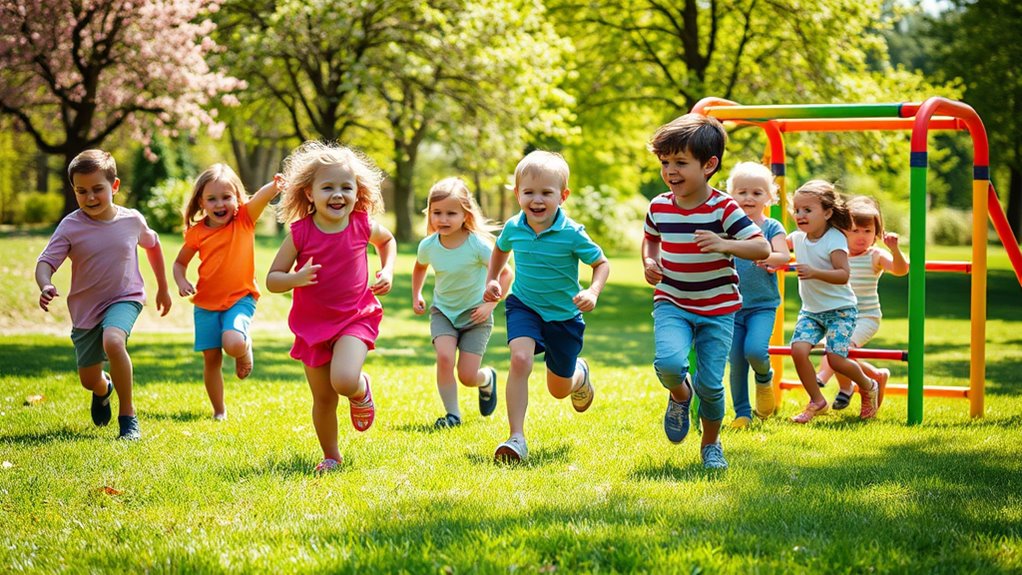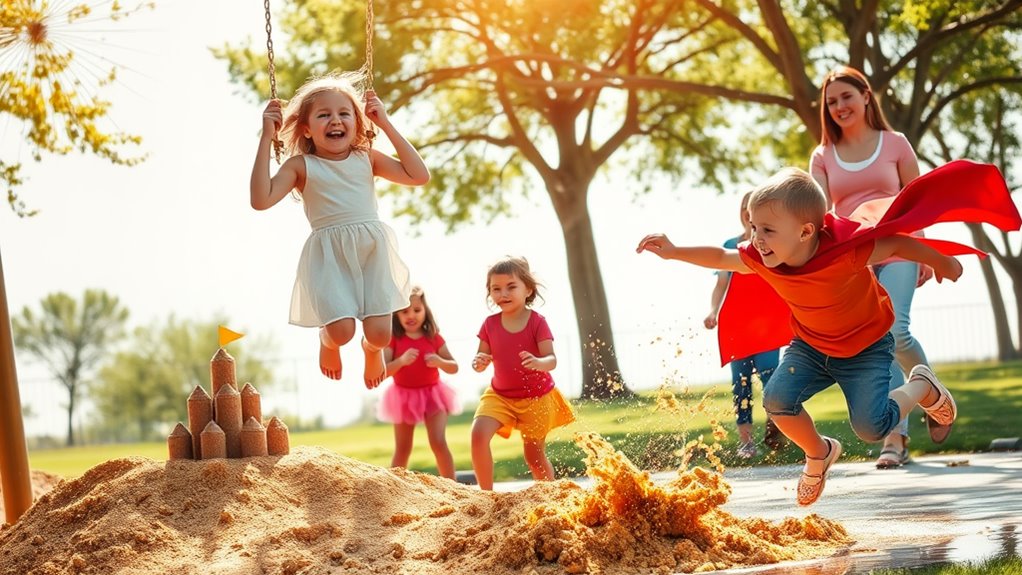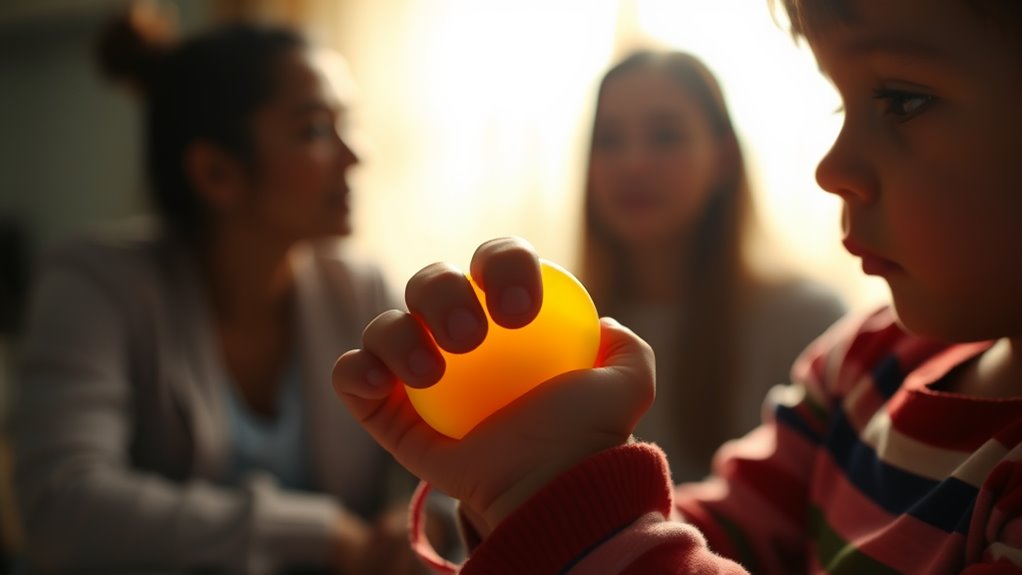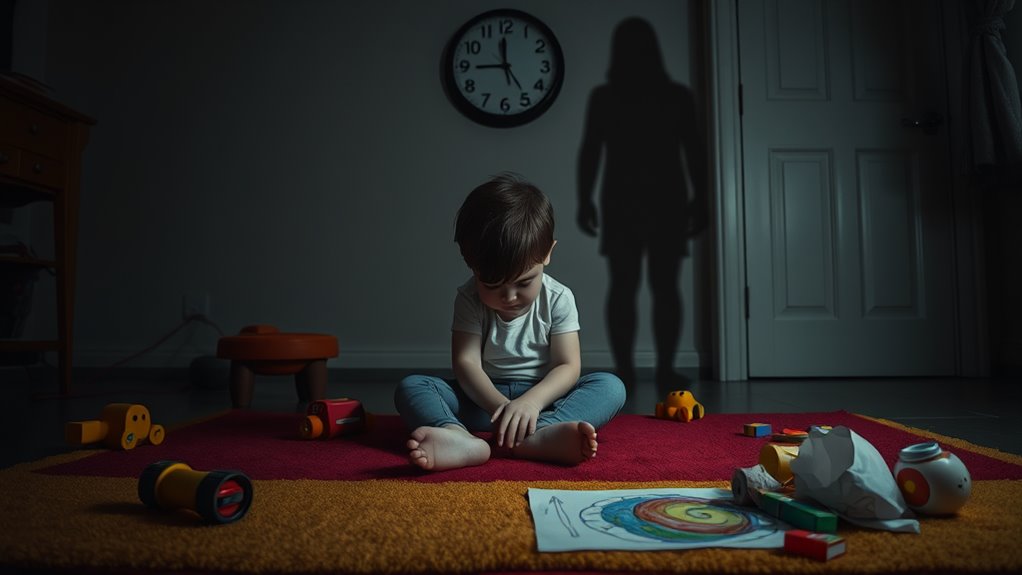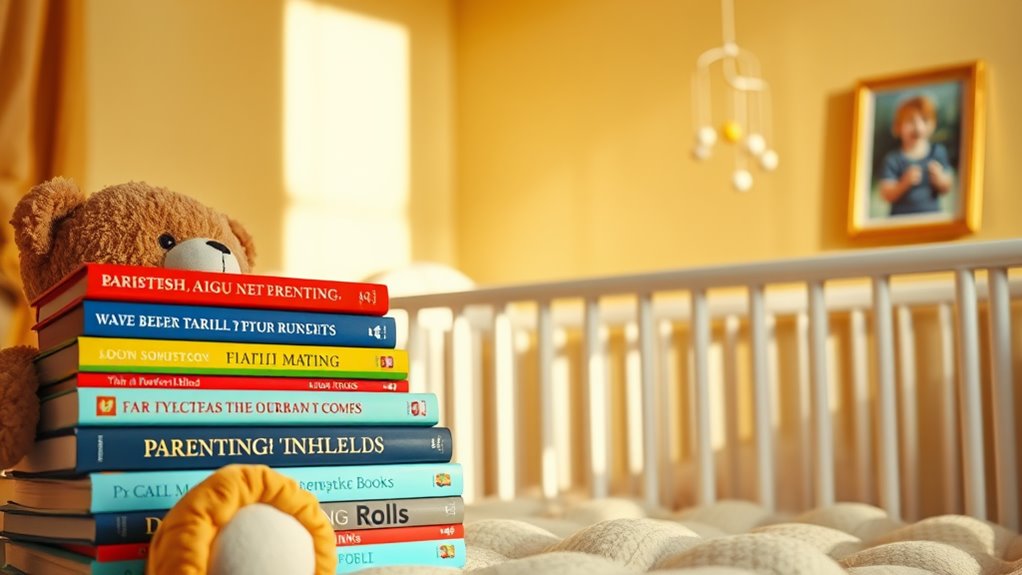Why Physical Activity Is Vital for Your Child’s Development
Physical activity is vital for your child’s development, impacting their physical health, cognitive skills, social interactions, and emotional well-being. Regular exercise keeps them active, supports growth, and helps them maintain a healthy weight. It also boosts brain function, enhancing memory and focus, leading to better academic performance. Moreover, participating in team sports helps build vital social skills and friendships, while also teaching them to handle emotions. Encouraging active play now fosters lifelong healthy habits. To discover more about how you can encourage an active lifestyle, keep exploring the many benefits of physical activity for your child.
Key Takeaways
- Physical activity supports overall physical health, providing essential nutrition and promoting growth through balanced energy levels and adequate sleep.
- Regular exercise enhances cognitive development, improving memory retention, concentration, and academic performance in children.
- Team sports develop social skills, fostering teamwork, communication, and conflict resolution among peers through cooperative activities.
- Engaging in physical activities boosts emotional well-being, helping children manage emotions and build resilience through challenges and achievements.
- Establishing active routines early encourages lifelong healthy habits, making physical activity a fun and integrated part of daily life.
Importance of Physical Health
When you consider a child’s overall development, it’s clear that physical health plays a crucial role. Ensuring your child maintains good physical health isn’t just about keeping them active; it’s also about achieving nutritional balance and promoting sleep quality. A well-rounded diet filled with essential nutrients fuels their energy levels and helps them grow. When kids eat a variety of fruits, vegetables, whole grains, and proteins, they’re not only supporting their physical development but also setting the stage for long-term health.
Moreover, sleep quality is equally important. Kids need adequate rest to recover from daily activities and support their growing bodies. Poor sleep can hinder their physical performance and affect their mood, making it harder for them to participate in activities they enjoy. By prioritizing both nutrition and sleep, you’re laying a solid foundation for your child’s physical health.
Encouraging regular physical activity, combined with a balanced diet and good sleep, can lead to a happier, healthier child. When you invest in these aspects of their lives, you’re not only enhancing their physical health but also nurturing their overall well-being, which is vital for their development.
Cognitive Benefits of Activity
Physical activity isn’t just vital for a child’s physical health; it also plays a significant role in cognitive development. When your child engages in regular exercise, they’re not only burning off energy but also boosting their brainpower. Research shows that physical activity leads to memory enhancement, helping kids retain information better and recall it more easily during studies and tests.
Moreover, you might notice your child’s concentration improvement after they’ve been active. Exercise increases blood flow to the brain, which can enhance cognitive functions like attention and focus. This is especially important for school-aged children, who often face challenges in maintaining their concentration during long lessons or homework sessions.
Encouraging your child to participate in activities they enjoy, whether it’s playing soccer, dancing, or simply running around at the park, can have lasting benefits for their cognitive abilities.
Social Skills Development
Engaging in physical activity offers children valuable opportunities to develop their social skills. When your child participates in team sports or group activities, they learn essential teamwork skills. They’ll understand the importance of working together toward a common goal, which fosters a sense of belonging and collaboration.
As they navigate these activities, kids also enhance their communication abilities. Whether it’s calling out plays in a game or discussing strategies with teammates, they’re practicing how to express themselves clearly and listen to others. This back-and-forth interaction is crucial for building confidence, as children learn to voice their opinions and respect differing viewpoints.
Additionally, physical activities often involve following rules and understanding the dynamics of competition. Your child will learn how to manage both winning and losing, which is vital for social interactions.
These experiences help them to not only build friendships but also resolve conflicts in a constructive manner.
Emotional Well-being and Resilience
Participating in sports and group activities not only fosters social connections but also significantly contributes to children’s emotional well-being and resilience. When your child engages in physical activities, they’re presented with opportunities to manage their emotions effectively. For instance, handling victories and defeats in games teaches them about emotional regulation, helping them understand that it’s okay to feel disappointed or excited.
Moreover, facing challenges during these activities promotes resilience building. Your child learns to push through difficulties, adapt to new situations, and bounce back from setbacks. This sense of achievement, whether it’s scoring a goal or mastering a new skill, boosts their self-esteem and reinforces a positive mindset.
As they navigate the ups and downs of teamwork and competition, they develop essential coping strategies that can benefit them in various areas of life. You’ll notice that these experiences extend beyond the field or court; they translate to the classroom and home, providing your child with a solid foundation for emotional health.
Encouraging your child to participate in physical activities is a powerful way to support their emotional development and help them grow into resilient individuals.
Building Lifelong Habits
Establishing active routines early in childhood can set the stage for a lifetime of healthy habits. When you encourage your child to embrace an active lifestyle, you’re not just promoting physical health; you’re instilling values that will benefit them for years to come.
Here are four ways to help build those lifelong habits:
-
Make it Fun: Choose activities your child enjoys, whether it’s dancing, swimming, or biking. The more they love it, the more likely they’ll stick with it.
-
Be a Role Model: Kids often imitate their parents. If they see you leading an active lifestyle, they’re more likely to adopt similar healthy routines.
-
Set Goals Together: Help your child set achievable fitness goals. This could be as simple as walking a certain number of steps each day or trying a new sport.
-
Incorporate Movement into Daily Life****: Find ways to integrate physical activity into everyday tasks, like walking to school or playing outside after dinner.
Encouraging Active Play
Active play is a key component of a child’s physical and social development. To encourage this, you can create opportunities for outdoor adventures that spark your child’s imagination and energy. Nature trails, parks, or even your backyard can serve as fantastic venues for exploration. Let them run, climb, and discover the world around them.
Incorporating creative games is another effective way to promote active play. Games like tag, hide-and-seek, or obstacle courses not only keep kids moving but also enhance their problem-solving skills and teamwork. You can even involve household items to create unique challenges, turning everyday objects into fun playthings.
Make it a point to join in on the fun! Your participation shows your child that being active is enjoyable and important. Plus, it strengthens your bond and sets a positive example.
Frequently Asked Questions
How Much Physical Activity Do Children Need Daily?
Children need at least 60 minutes of physical activity daily, according to recommended guidelines. The exact amount varies by age, with younger kids often needing more playtime, while older ones can focus on structured activities.
What Types of Activities Are Best for Young Children?
For young children, outdoor play and creative movement are best. Activities like running, climbing, dancing, or playing games encourage exploration and imagination, helping them develop motor skills while having fun in a safe, engaging environment.
Are There Risks Associated With Too Much Physical Activity?
Yes, there’re risks with too much physical activity. You might see overuse injuries, you might notice mental fatigue, and you might find your child’s enthusiasm waning. Balance is key to a healthy lifestyle.
How Can Parents Motivate Children to Stay Active?
To motivate your children to stay active, consider implementing reward systems for their efforts and involve the whole family in fun activities. This creates a supportive environment that encourages healthy habits and strengthens bonds.
What Role Does Nutrition Play in Physical Activity Effectiveness?
Nutrition’s key to making physical activity effective. When you ensure your child has a nutritional balance, it boosts their energy levels, helping them stay active longer and perform better in their favorite activities.

